Alaaeddin El Haniche - Reflective Report on Teamwork and Coursework
VerifiedAdded on 2022/01/27
|8
|1566
|56
Report
AI Summary
This reflective report by Alaaeddin El Haniche examines his experience in a teamwork setting as part of a coursework assignment. The report begins with an introduction to reflective systems and their importance in understanding learning and experience. It then details the team's development using Tuckman's stages of team development, outlining the forming, storming, norming, performing, and adjourning phases. The author describes his role within the team, referencing Belbin's team role theory to explain his contributions as a team worker, plant, sharper, and resource investigator. The report highlights the strengths of the group, emphasizing the supportive and knowledgeable nature of the team members and their effective communication. The report also addresses the difficulties faced, particularly social competition as described by social identity theory, and how the team addressed these challenges. The author reflects on his contributions, including communication, idea generation, and progress monitoring, and concludes with lessons learned about effective teamwork, such as the importance of communication, conflict resolution, and knowledge sharing. The report references several academic sources to support its analysis.
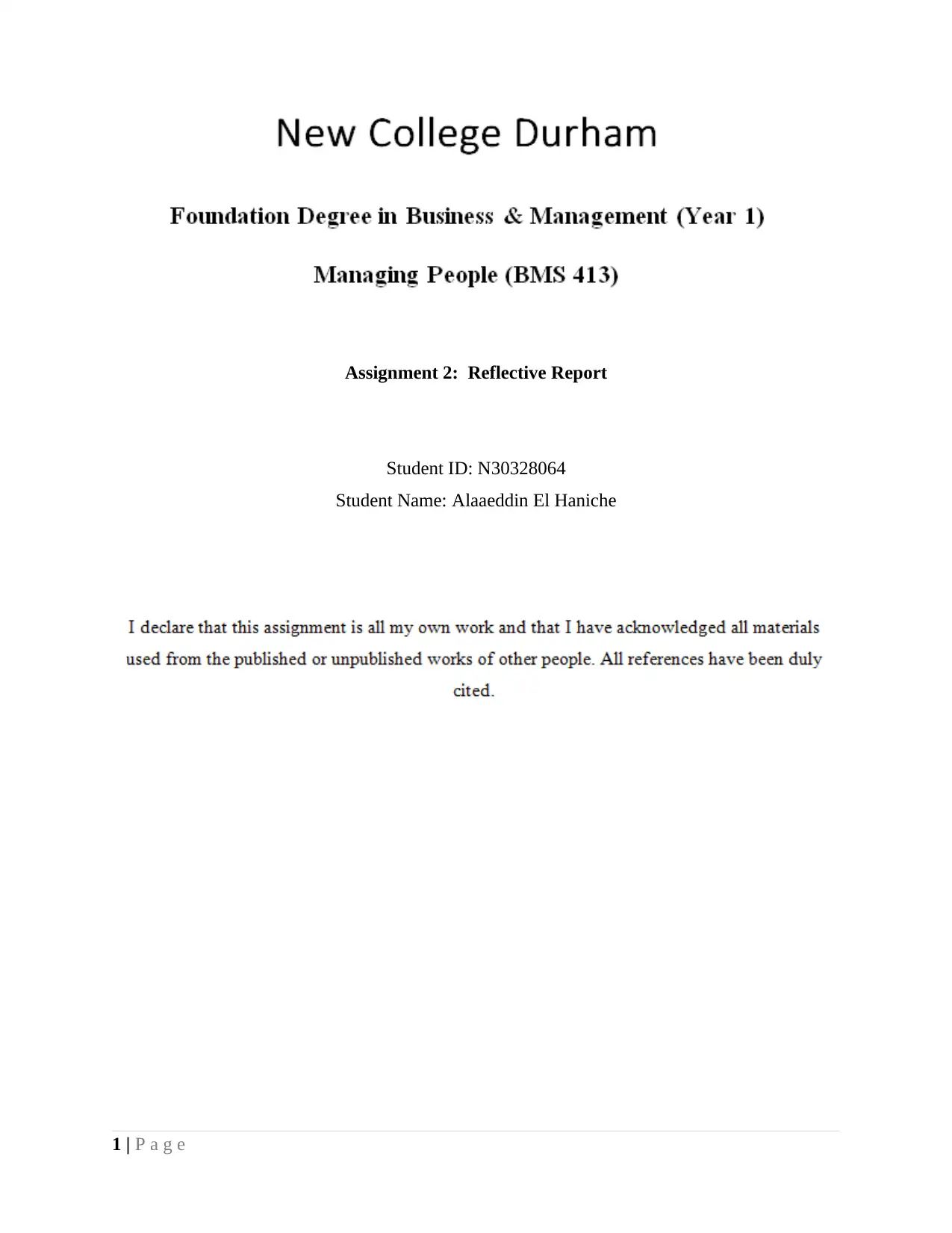
Assignment 2: Reflective Report
Student ID: N30328064
Student Name: Alaaeddin El Haniche
1 | P a g e
Student ID: N30328064
Student Name: Alaaeddin El Haniche
1 | P a g e
Paraphrase This Document
Need a fresh take? Get an instant paraphrase of this document with our AI Paraphraser
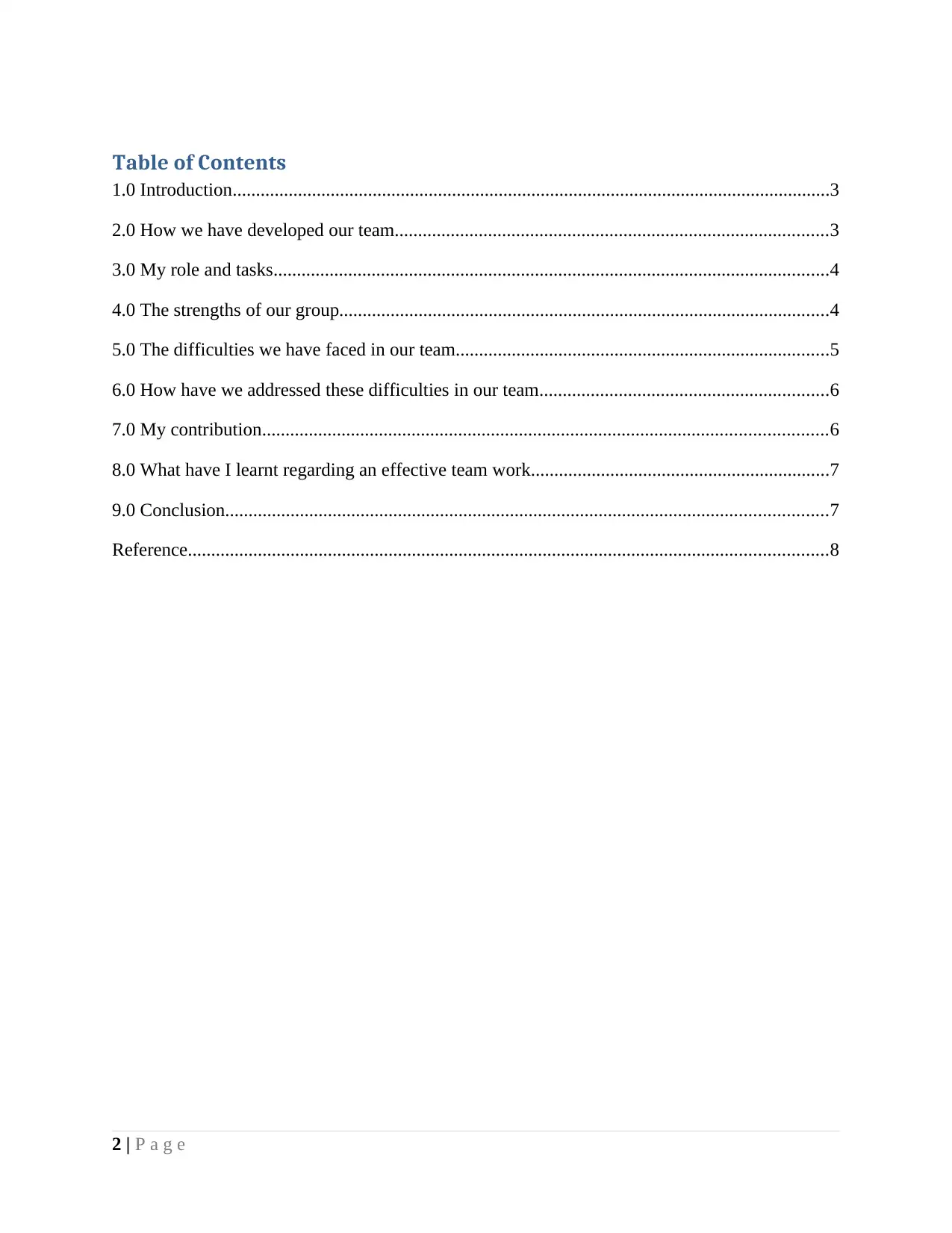
Table of Contents
1.0 Introduction................................................................................................................................3
2.0 How we have developed our team.............................................................................................3
3.0 My role and tasks.......................................................................................................................4
4.0 The strengths of our group.........................................................................................................4
5.0 The difficulties we have faced in our team................................................................................5
6.0 How have we addressed these difficulties in our team..............................................................6
7.0 My contribution.........................................................................................................................6
8.0 What have I learnt regarding an effective team work................................................................7
9.0 Conclusion.................................................................................................................................7
Reference.........................................................................................................................................8
2 | P a g e
1.0 Introduction................................................................................................................................3
2.0 How we have developed our team.............................................................................................3
3.0 My role and tasks.......................................................................................................................4
4.0 The strengths of our group.........................................................................................................4
5.0 The difficulties we have faced in our team................................................................................5
6.0 How have we addressed these difficulties in our team..............................................................6
7.0 My contribution.........................................................................................................................6
8.0 What have I learnt regarding an effective team work................................................................7
9.0 Conclusion.................................................................................................................................7
Reference.........................................................................................................................................8
2 | P a g e
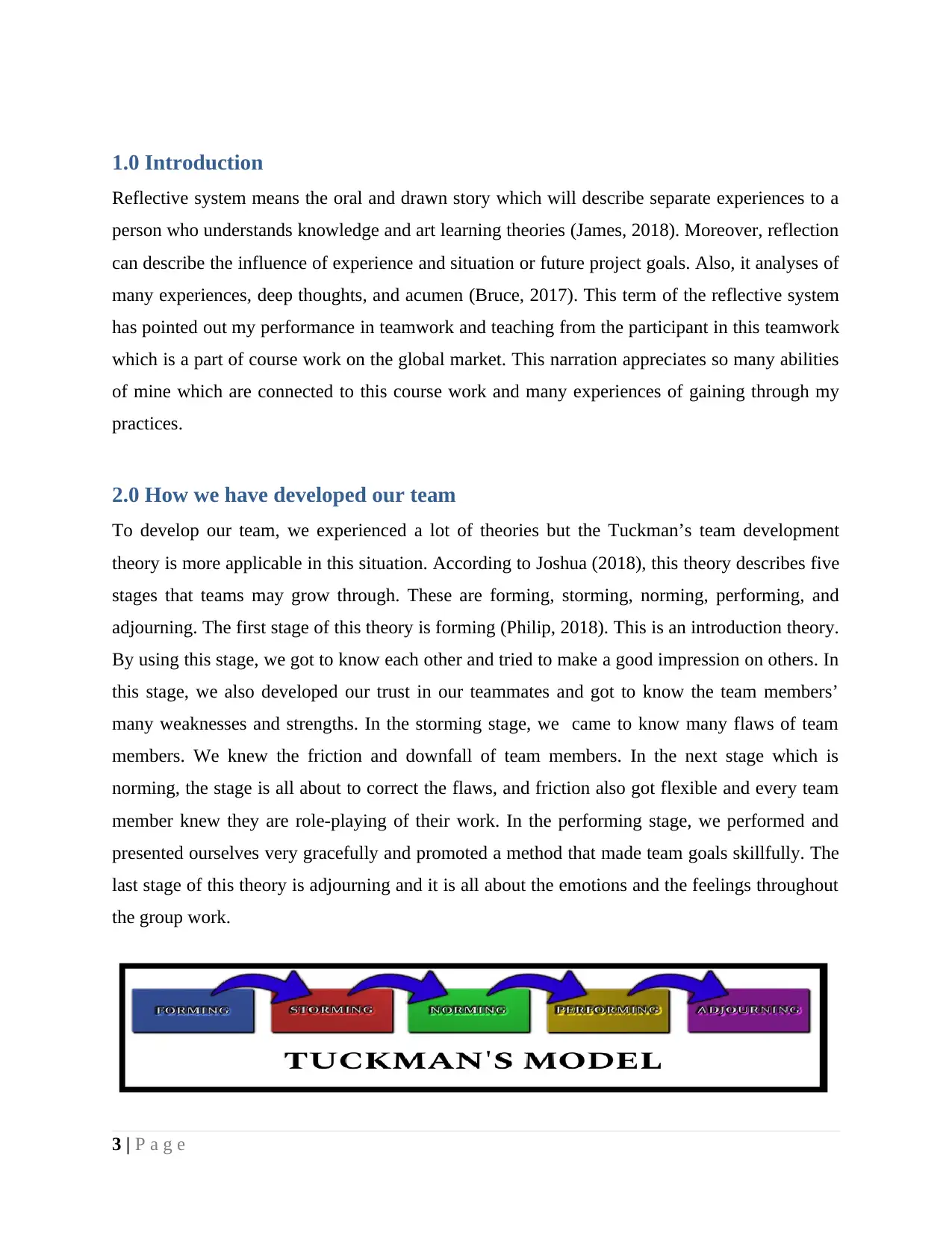
1.0 Introduction
Reflective system means the oral and drawn story which will describe separate experiences to a
person who understands knowledge and art learning theories (James, 2018). Moreover, reflection
can describe the influence of experience and situation or future project goals. Also, it analyses of
many experiences, deep thoughts, and acumen (Bruce, 2017). This term of the reflective system
has pointed out my performance in teamwork and teaching from the participant in this teamwork
which is a part of course work on the global market. This narration appreciates so many abilities
of mine which are connected to this course work and many experiences of gaining through my
practices.
2.0 How we have developed our team
To develop our team, we experienced a lot of theories but the Tuckman’s team development
theory is more applicable in this situation. According to Joshua (2018), this theory describes five
stages that teams may grow through. These are forming, storming, norming, performing, and
adjourning. The first stage of this theory is forming (Philip, 2018). This is an introduction theory.
By using this stage, we got to know each other and tried to make a good impression on others. In
this stage, we also developed our trust in our teammates and got to know the team members’
many weaknesses and strengths. In the storming stage, we came to know many flaws of team
members. We knew the friction and downfall of team members. In the next stage which is
norming, the stage is all about to correct the flaws, and friction also got flexible and every team
member knew they are role-playing of their work. In the performing stage, we performed and
presented ourselves very gracefully and promoted a method that made team goals skillfully. The
last stage of this theory is adjourning and it is all about the emotions and the feelings throughout
the group work.
3 | P a g e
Reflective system means the oral and drawn story which will describe separate experiences to a
person who understands knowledge and art learning theories (James, 2018). Moreover, reflection
can describe the influence of experience and situation or future project goals. Also, it analyses of
many experiences, deep thoughts, and acumen (Bruce, 2017). This term of the reflective system
has pointed out my performance in teamwork and teaching from the participant in this teamwork
which is a part of course work on the global market. This narration appreciates so many abilities
of mine which are connected to this course work and many experiences of gaining through my
practices.
2.0 How we have developed our team
To develop our team, we experienced a lot of theories but the Tuckman’s team development
theory is more applicable in this situation. According to Joshua (2018), this theory describes five
stages that teams may grow through. These are forming, storming, norming, performing, and
adjourning. The first stage of this theory is forming (Philip, 2018). This is an introduction theory.
By using this stage, we got to know each other and tried to make a good impression on others. In
this stage, we also developed our trust in our teammates and got to know the team members’
many weaknesses and strengths. In the storming stage, we came to know many flaws of team
members. We knew the friction and downfall of team members. In the next stage which is
norming, the stage is all about to correct the flaws, and friction also got flexible and every team
member knew they are role-playing of their work. In the performing stage, we performed and
presented ourselves very gracefully and promoted a method that made team goals skillfully. The
last stage of this theory is adjourning and it is all about the emotions and the feelings throughout
the group work.
3 | P a g e
You're viewing a preview
Unlock full access by subscribing today!
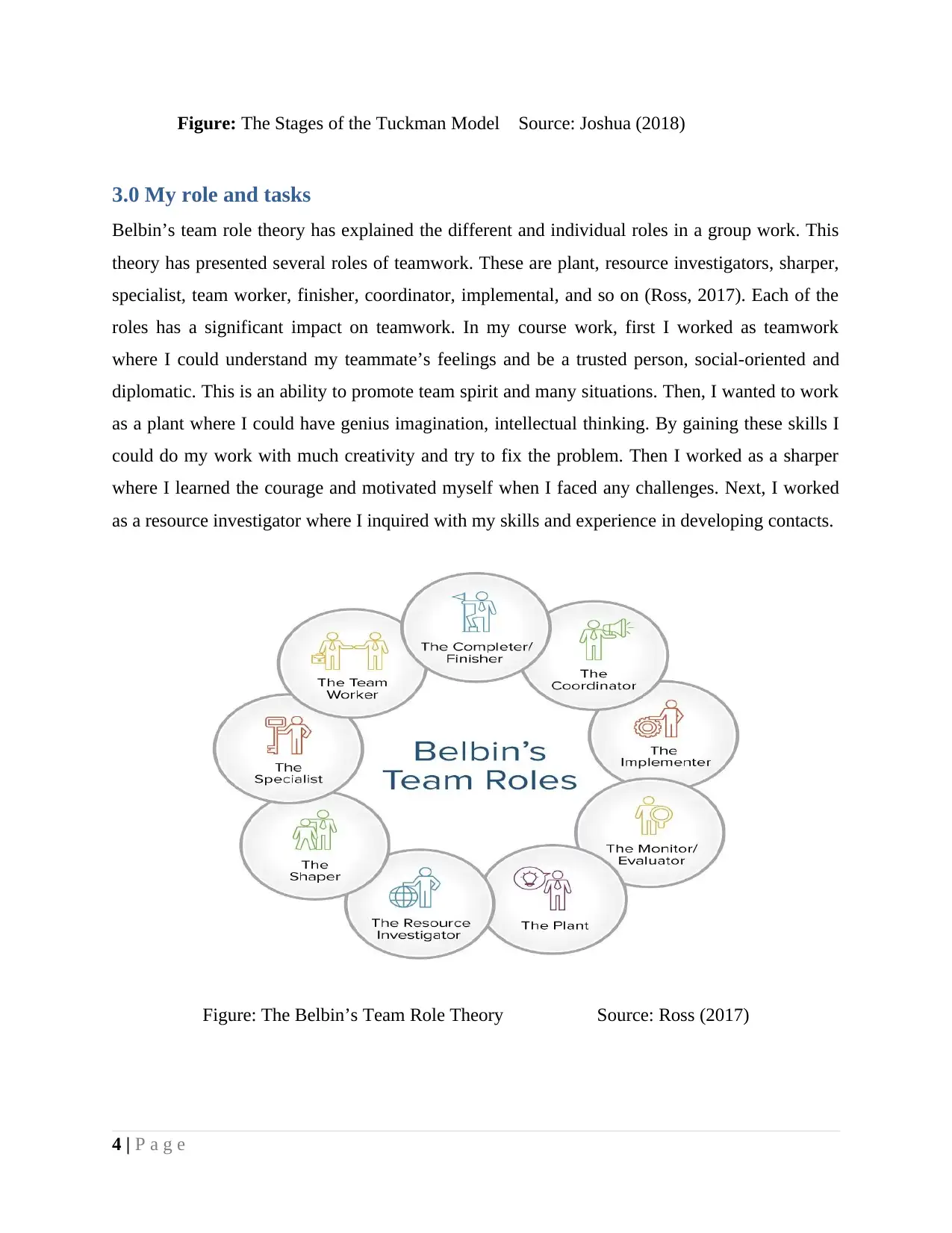
Figure: The Stages of the Tuckman Model Source: Joshua (2018)
3.0 My role and tasks
Belbin’s team role theory has explained the different and individual roles in a group work. This
theory has presented several roles of teamwork. These are plant, resource investigators, sharper,
specialist, team worker, finisher, coordinator, implemental, and so on (Ross, 2017). Each of the
roles has a significant impact on teamwork. In my course work, first I worked as teamwork
where I could understand my teammate’s feelings and be a trusted person, social-oriented and
diplomatic. This is an ability to promote team spirit and many situations. Then, I wanted to work
as a plant where I could have genius imagination, intellectual thinking. By gaining these skills I
could do my work with much creativity and try to fix the problem. Then I worked as a sharper
where I learned the courage and motivated myself when I faced any challenges. Next, I worked
as a resource investigator where I inquired with my skills and experience in developing contacts.
Figure: The Belbin’s Team Role Theory Source: Ross (2017)
4 | P a g e
3.0 My role and tasks
Belbin’s team role theory has explained the different and individual roles in a group work. This
theory has presented several roles of teamwork. These are plant, resource investigators, sharper,
specialist, team worker, finisher, coordinator, implemental, and so on (Ross, 2017). Each of the
roles has a significant impact on teamwork. In my course work, first I worked as teamwork
where I could understand my teammate’s feelings and be a trusted person, social-oriented and
diplomatic. This is an ability to promote team spirit and many situations. Then, I wanted to work
as a plant where I could have genius imagination, intellectual thinking. By gaining these skills I
could do my work with much creativity and try to fix the problem. Then I worked as a sharper
where I learned the courage and motivated myself when I faced any challenges. Next, I worked
as a resource investigator where I inquired with my skills and experience in developing contacts.
Figure: The Belbin’s Team Role Theory Source: Ross (2017)
4 | P a g e
Paraphrase This Document
Need a fresh take? Get an instant paraphrase of this document with our AI Paraphraser
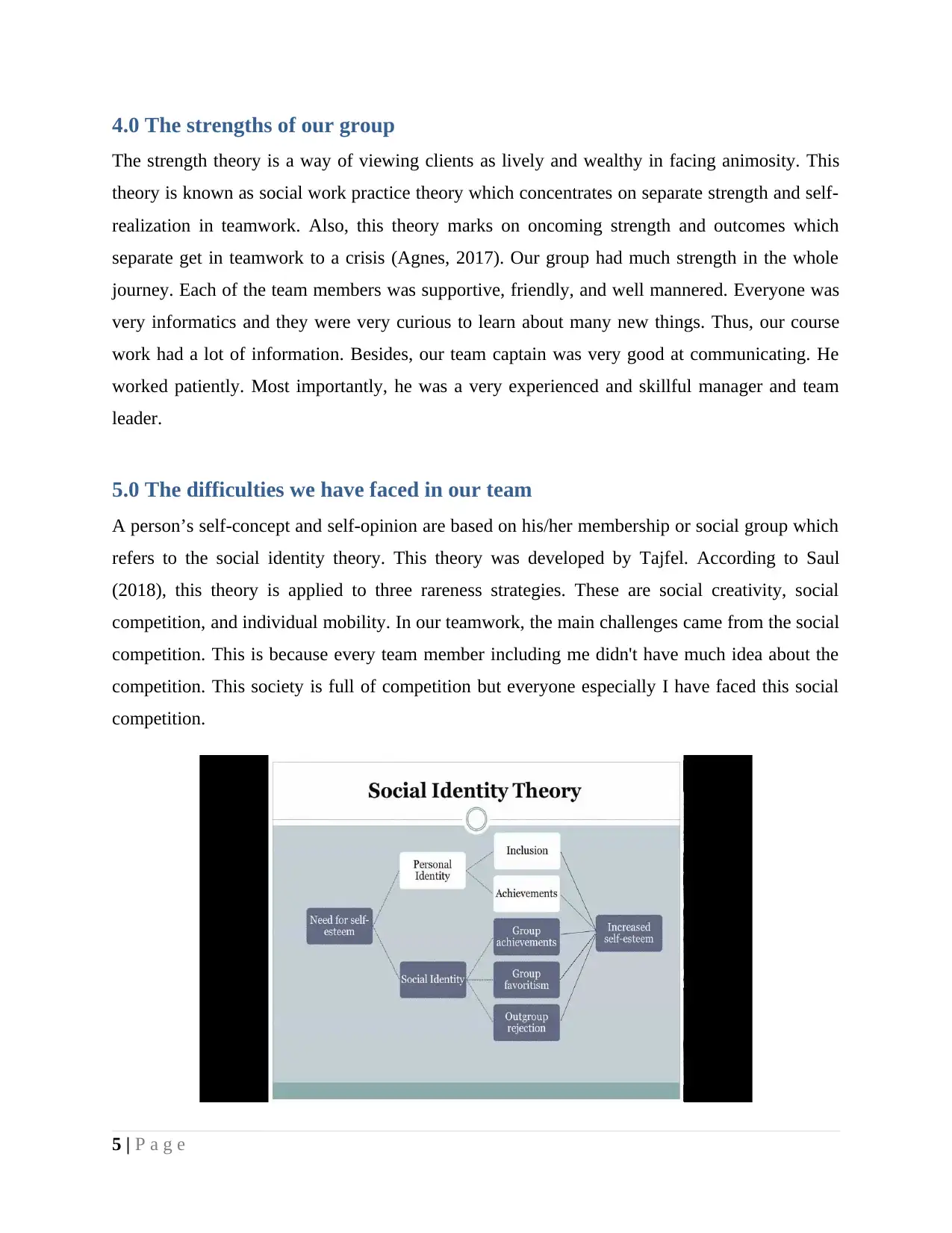
4.0 The strengths of our group
The strength theory is a way of viewing clients as lively and wealthy in facing animosity. This
theory is known as social work practice theory which concentrates on separate strength and self-
realization in teamwork. Also, this theory marks on oncoming strength and outcomes which
separate get in teamwork to a crisis (Agnes, 2017). Our group had much strength in the whole
journey. Each of the team members was supportive, friendly, and well mannered. Everyone was
very informatics and they were very curious to learn about many new things. Thus, our course
work had a lot of information. Besides, our team captain was very good at communicating. He
worked patiently. Most importantly, he was a very experienced and skillful manager and team
leader.
5.0 The difficulties we have faced in our team
A person’s self-concept and self-opinion are based on his/her membership or social group which
refers to the social identity theory. This theory was developed by Tajfel. According to Saul
(2018), this theory is applied to three rareness strategies. These are social creativity, social
competition, and individual mobility. In our teamwork, the main challenges came from the social
competition. This is because every team member including me didn't have much idea about the
competition. This society is full of competition but everyone especially I have faced this social
competition.
5 | P a g e
The strength theory is a way of viewing clients as lively and wealthy in facing animosity. This
theory is known as social work practice theory which concentrates on separate strength and self-
realization in teamwork. Also, this theory marks on oncoming strength and outcomes which
separate get in teamwork to a crisis (Agnes, 2017). Our group had much strength in the whole
journey. Each of the team members was supportive, friendly, and well mannered. Everyone was
very informatics and they were very curious to learn about many new things. Thus, our course
work had a lot of information. Besides, our team captain was very good at communicating. He
worked patiently. Most importantly, he was a very experienced and skillful manager and team
leader.
5.0 The difficulties we have faced in our team
A person’s self-concept and self-opinion are based on his/her membership or social group which
refers to the social identity theory. This theory was developed by Tajfel. According to Saul
(2018), this theory is applied to three rareness strategies. These are social creativity, social
competition, and individual mobility. In our teamwork, the main challenges came from the social
competition. This is because every team member including me didn't have much idea about the
competition. This society is full of competition but everyone especially I have faced this social
competition.
5 | P a g e
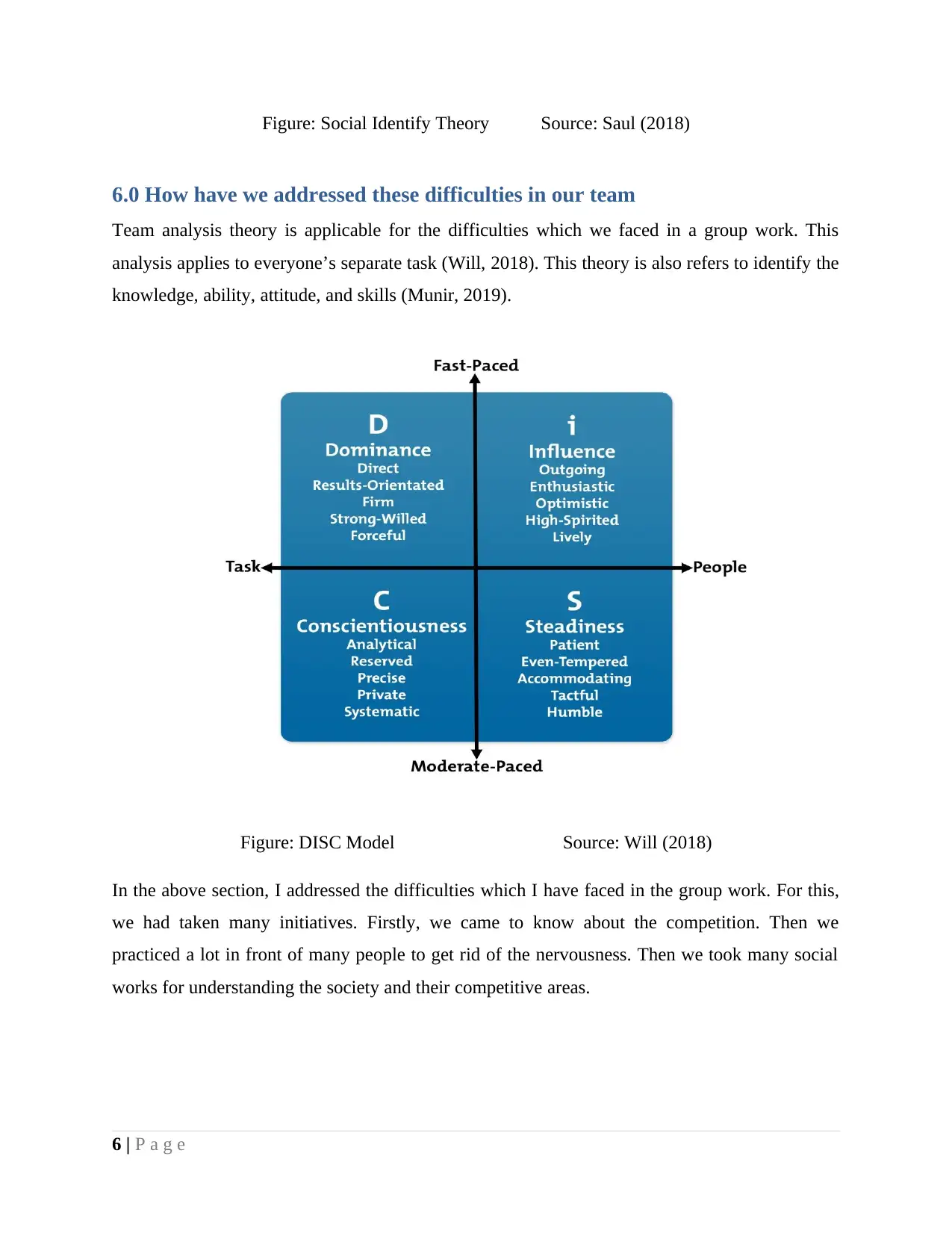
Figure: Social Identify Theory Source: Saul (2018)
6.0 How have we addressed these difficulties in our team
Team analysis theory is applicable for the difficulties which we faced in a group work. This
analysis applies to everyone’s separate task (Will, 2018). This theory is also refers to identify the
knowledge, ability, attitude, and skills (Munir, 2019).
Figure: DISC Model Source: Will (2018)
In the above section, I addressed the difficulties which I have faced in the group work. For this,
we had taken many initiatives. Firstly, we came to know about the competition. Then we
practiced a lot in front of many people to get rid of the nervousness. Then we took many social
works for understanding the society and their competitive areas.
6 | P a g e
6.0 How have we addressed these difficulties in our team
Team analysis theory is applicable for the difficulties which we faced in a group work. This
analysis applies to everyone’s separate task (Will, 2018). This theory is also refers to identify the
knowledge, ability, attitude, and skills (Munir, 2019).
Figure: DISC Model Source: Will (2018)
In the above section, I addressed the difficulties which I have faced in the group work. For this,
we had taken many initiatives. Firstly, we came to know about the competition. Then we
practiced a lot in front of many people to get rid of the nervousness. Then we took many social
works for understanding the society and their competitive areas.
6 | P a g e
You're viewing a preview
Unlock full access by subscribing today!
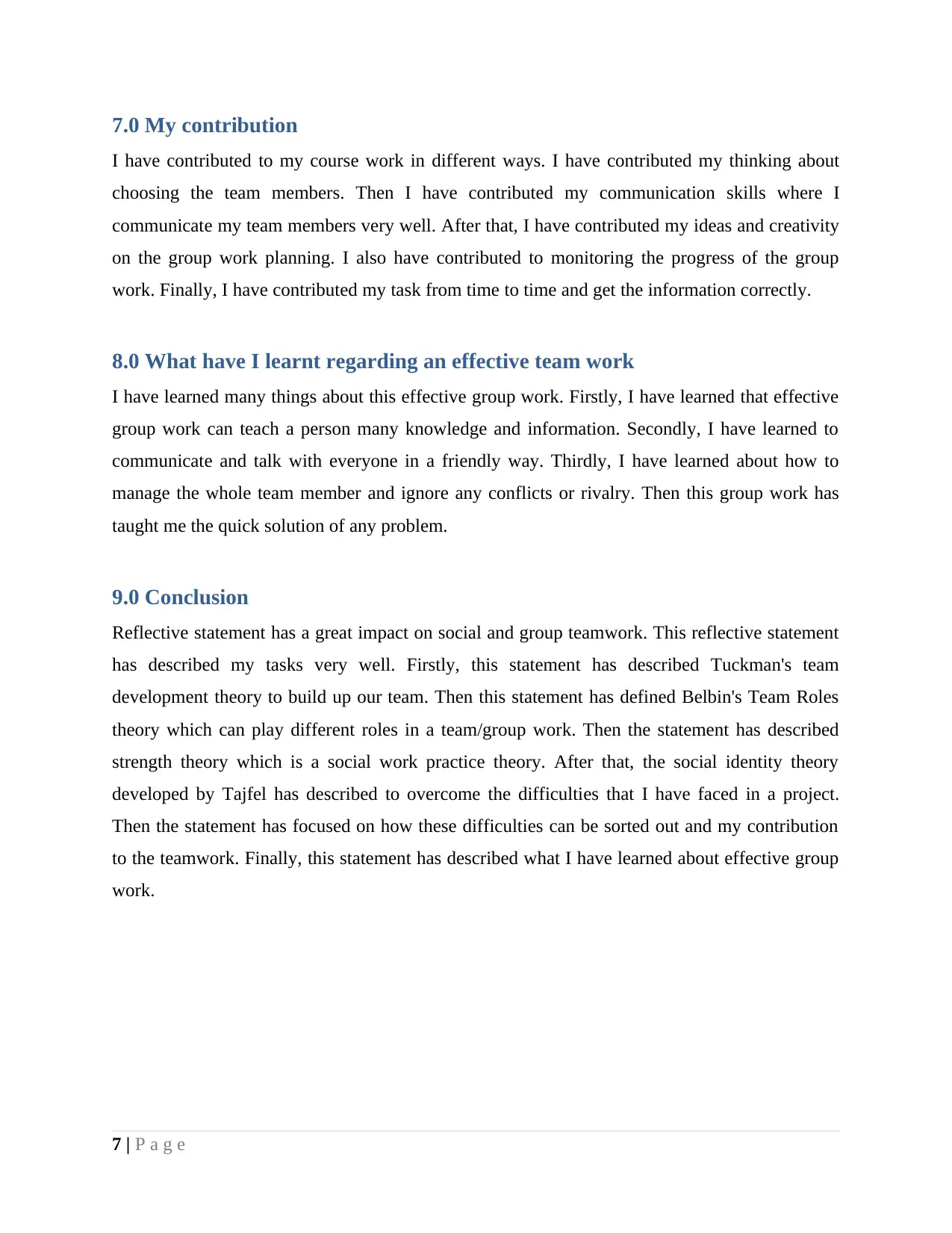
7.0 My contribution
I have contributed to my course work in different ways. I have contributed my thinking about
choosing the team members. Then I have contributed my communication skills where I
communicate my team members very well. After that, I have contributed my ideas and creativity
on the group work planning. I also have contributed to monitoring the progress of the group
work. Finally, I have contributed my task from time to time and get the information correctly.
8.0 What have I learnt regarding an effective team work
I have learned many things about this effective group work. Firstly, I have learned that effective
group work can teach a person many knowledge and information. Secondly, I have learned to
communicate and talk with everyone in a friendly way. Thirdly, I have learned about how to
manage the whole team member and ignore any conflicts or rivalry. Then this group work has
taught me the quick solution of any problem.
9.0 Conclusion
Reflective statement has a great impact on social and group teamwork. This reflective statement
has described my tasks very well. Firstly, this statement has described Tuckman's team
development theory to build up our team. Then this statement has defined Belbin's Team Roles
theory which can play different roles in a team/group work. Then the statement has described
strength theory which is a social work practice theory. After that, the social identity theory
developed by Tajfel has described to overcome the difficulties that I have faced in a project.
Then the statement has focused on how these difficulties can be sorted out and my contribution
to the teamwork. Finally, this statement has described what I have learned about effective group
work.
7 | P a g e
I have contributed to my course work in different ways. I have contributed my thinking about
choosing the team members. Then I have contributed my communication skills where I
communicate my team members very well. After that, I have contributed my ideas and creativity
on the group work planning. I also have contributed to monitoring the progress of the group
work. Finally, I have contributed my task from time to time and get the information correctly.
8.0 What have I learnt regarding an effective team work
I have learned many things about this effective group work. Firstly, I have learned that effective
group work can teach a person many knowledge and information. Secondly, I have learned to
communicate and talk with everyone in a friendly way. Thirdly, I have learned about how to
manage the whole team member and ignore any conflicts or rivalry. Then this group work has
taught me the quick solution of any problem.
9.0 Conclusion
Reflective statement has a great impact on social and group teamwork. This reflective statement
has described my tasks very well. Firstly, this statement has described Tuckman's team
development theory to build up our team. Then this statement has defined Belbin's Team Roles
theory which can play different roles in a team/group work. Then the statement has described
strength theory which is a social work practice theory. After that, the social identity theory
developed by Tajfel has described to overcome the difficulties that I have faced in a project.
Then the statement has focused on how these difficulties can be sorted out and my contribution
to the teamwork. Finally, this statement has described what I have learned about effective group
work.
7 | P a g e
Paraphrase This Document
Need a fresh take? Get an instant paraphrase of this document with our AI Paraphraser
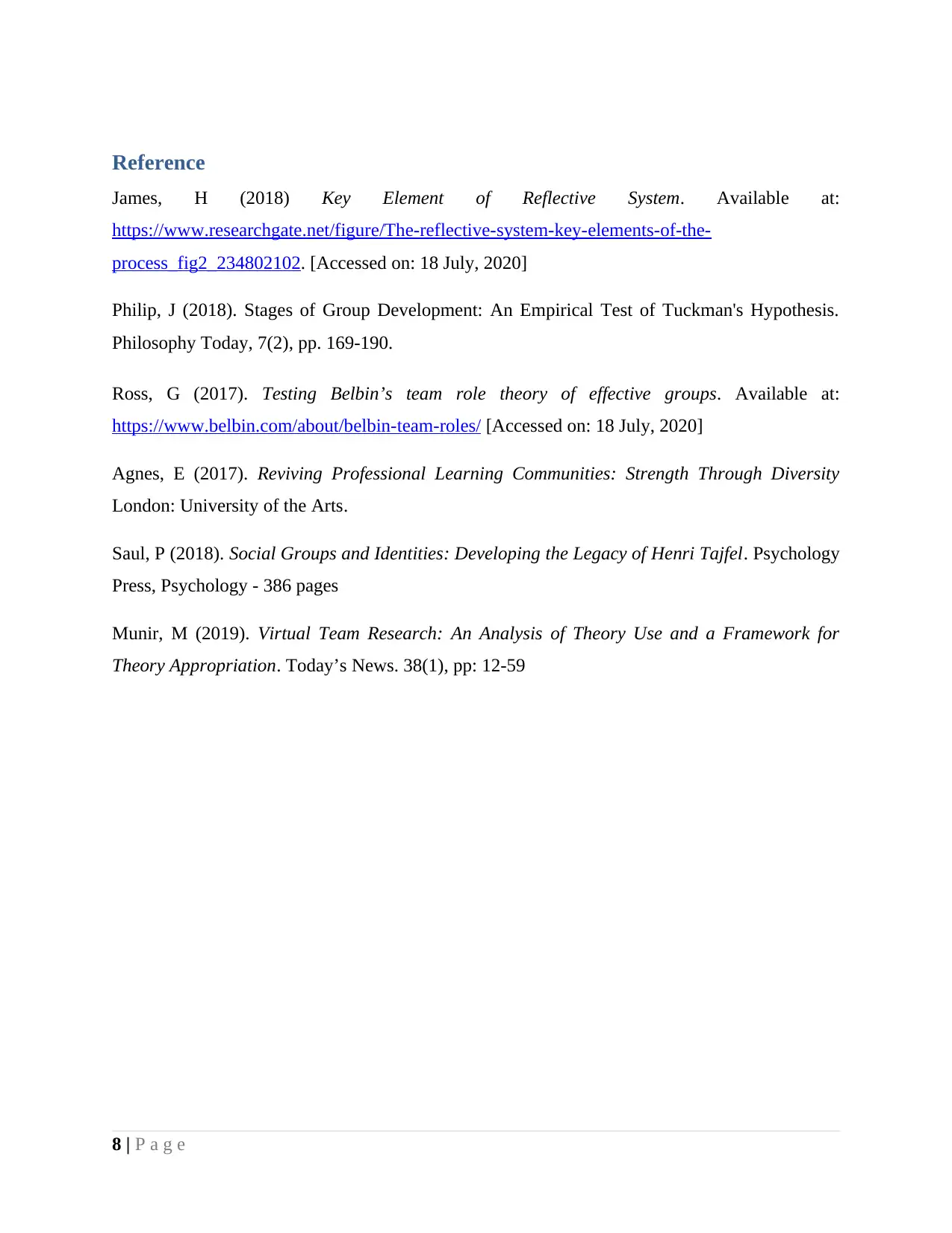
Reference
James, H (2018) Key Element of Reflective System. Available at:
https://www.researchgate.net/figure/The-reflective-system-key-elements-of-the-
process_fig2_234802102. [Accessed on: 18 July, 2020]
Philip, J (2018). Stages of Group Development: An Empirical Test of Tuckman's Hypothesis.
Philosophy Today, 7(2), pp. 169-190.
Ross, G (2017). Testing Belbin’s team role theory of effective groups. Available at:
https://www.belbin.com/about/belbin-team-roles/ [Accessed on: 18 July, 2020]
Agnes, E (2017). Reviving Professional Learning Communities: Strength Through Diversity
London: University of the Arts.
Saul, P (2018). Social Groups and Identities: Developing the Legacy of Henri Tajfel. Psychology
Press, Psychology - 386 pages
Munir, M (2019). Virtual Team Research: An Analysis of Theory Use and a Framework for
Theory Appropriation. Today’s News. 38(1), pp: 12-59
8 | P a g e
James, H (2018) Key Element of Reflective System. Available at:
https://www.researchgate.net/figure/The-reflective-system-key-elements-of-the-
process_fig2_234802102. [Accessed on: 18 July, 2020]
Philip, J (2018). Stages of Group Development: An Empirical Test of Tuckman's Hypothesis.
Philosophy Today, 7(2), pp. 169-190.
Ross, G (2017). Testing Belbin’s team role theory of effective groups. Available at:
https://www.belbin.com/about/belbin-team-roles/ [Accessed on: 18 July, 2020]
Agnes, E (2017). Reviving Professional Learning Communities: Strength Through Diversity
London: University of the Arts.
Saul, P (2018). Social Groups and Identities: Developing the Legacy of Henri Tajfel. Psychology
Press, Psychology - 386 pages
Munir, M (2019). Virtual Team Research: An Analysis of Theory Use and a Framework for
Theory Appropriation. Today’s News. 38(1), pp: 12-59
8 | P a g e
1 out of 8
Related Documents
Your All-in-One AI-Powered Toolkit for Academic Success.
+13062052269
info@desklib.com
Available 24*7 on WhatsApp / Email
![[object Object]](/_next/static/media/star-bottom.7253800d.svg)
Unlock your academic potential
© 2024 | Zucol Services PVT LTD | All rights reserved.





